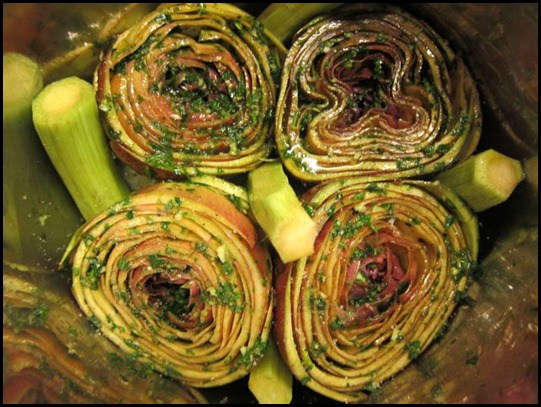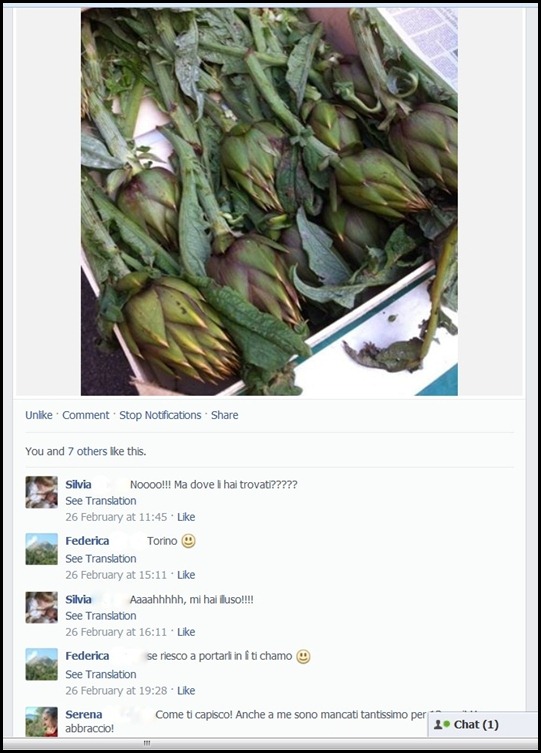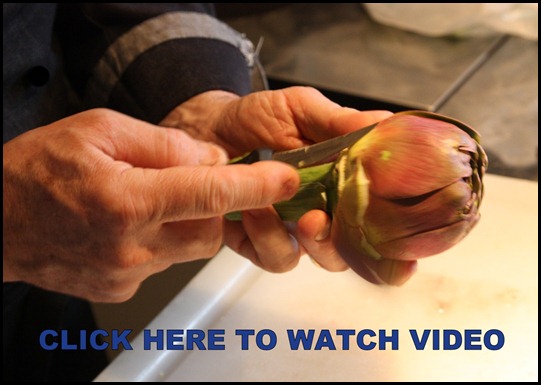Come Pulire i Carciofi Posted by Serena on Mar 3, 2014 in Uncategorized
A couple of days ago on my cousin Federica’s Facebook I dropped in on this typically Italian chat about a photo of a box of globe artichokes:
Federica: “Carciofi!!!” (Artichokes!!!)
Silvia: “Nooo!!! Ma dove li hai trovati???” (Nooo!!! Where did you find them???)
Federica: “Torino ![]() ” (Turin)
” (Turin)
Silvia: “Aaaahhhhh, mi hai illuso!!!!” (Aaaahhhhh, you got my hopes up!!!)
Federica: “Se riesco a portarli lì ti chiamo ![]() ” (If I manage to bring them there I’ll call you)
” (If I manage to bring them there I’ll call you)
Federica lives in Stockholm (Sweden), but at the moment she’s back in Turin visiting her family, and it’s there that she found the artichokes. Carciofi are a seasonal delicacy for us Italians, but apparently rare to find in many countries outside Italy, and when I lived in England I really missed them, so I can relate to the above dialogue. Despite the fact that according to Geoff they don’t taste of anything, in my opinion artichokes have a very delicate and unique flavour, which makes it worth putting up with the not too easy task of cleaning and preparing them.
Pulire i carciofi (cleaning globe artichokes) is an art which you can only learn by watching somebody doing it. I found a nice video on YouTube, which I particularly like because Nonna Rosa (the lady in the video) cleans the artichokes parsimoniously just like my grandmother used to do, not like some of the pretentious experts of the ‘professional videos’ that you find, who axe them away with massive scary looking butcher’s knifes. When Nonna Rosa delicately cleans the artichokes she places her thumb at the base of the leaves to save the tender parts. Moreover, she specifically says that you don’t need to dig out the heart of the artichokes unless they are old and hard, and full of lana (wool, her expression, meaning the fluffiness inside the artichoke where the seeds of the flower will eventually form).
Nonna Rosa speaks with a Neapolitan accent which is not always clear to understand, especially with the ‘jolly’ background music, and she uses some typical southern expressions, such as mo’ (now), or ve’ short for vedi (you see). Here’s my transcription of the video, with a translation into English.
Allora, prima devi sbucciare queste ??? (rumore di sedia) …. che sono duri … ecco, no? così, no? metti il dito qua, no? qua, in modo che lascia questo … questo frutto qua. Ecco, adesso che le hai tirate tutte le foglie intorno … devi tagliare qua così, … e buttare via. Mo’ questi li tagli così … ecco, leva tutto … il duro, questo è duro. Mo’ devi fare così, ve’, … questo per friggere … a spicchio, così.
So, first you have to peel these ??? (noise of a chair) … which are hard … aren’t they? like this, right? put your finger here, okay? here, so that it leaves this … this fruit here. Now that you have removed all the leaves around … you must cut here like this, … and throw it away. Now you cut these like this … , remove everything … the hard part, this is hard. Now you have to do it like this, you see, like this if you fry them … in segments, like this.
Se tu poi li devi far col riso, allora tu li tagli a fettina sottile di qua … lo taglio un po’ per farti vedere? Allora se tu devi far col riso devi far così, sottile sottile, così. Dentro ci metti il limone per farli rimanere belli bianchi così.
If you are going to cook them with rice, then you’ll cut them in thin slices here … shall I cut a bit to show you? So, if you are going to cook them with rice you must do it like this, very thinly, like this. You put the lemon in (see note below) so they remain nice and white like this.
Poi quando diventano duri i carciofi ….. perché qua fanno la lana, qua fa la lana. Questo è fresco perché è giovane. Quando diventano vecchi che fan la lana, tu la devi far così, una lana … questa è tenera perché è giovane, vedi? invece quando è duro, poi ci son le spine … che pungono in bocca, allora lo devi scavare un po’ così.
Then when the artichokes become hard ….. because they make the wool here, it makes the wool here. This is fresh because it’s young. When they become old and they make the wool, you must do it like this, a wool … this is tender because it’s young, can you see? Instead when it’s hard, then there are thorns … that prick your mouth, then you must dig it out a little bit like this.
Poi, questo qua, questo lo devi buttare, e questo lo puoi cucinare. Lo pulisci prima.
Then this one here, you must throw this away, and you can cook this one. First you clean it.
N.B. Dentro ci metti il limone: what Nonna Rosa means is that to prevent the artichokes from going black when they come into contact with air, you should always put the juice of half a lemon in the water. What’s more, either wear gloves or use the lemon to clean your hands when you have finished peeling the artichokes, because they will stain your fingers an unsightly looking dark brown colour.
 |
| Cleaning carciofi is a lot of work … but well worth it! |

Build vocabulary, practice pronunciation, and more with Transparent Language Online. Available anytime, anywhere, on any device.






Leave a comment: